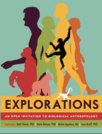
New Testbanks
- Subject:
- Anthropology
- Material Type:
- Assessment
- Author:
- Linda Neff
- Date Added:
- 10/04/2022

New Testbanks
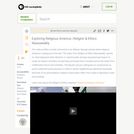
In this video segment from Religion & Ethics Newsweekly, learn about Muslims in Lawrenceville, Georgia, their plans to build an Islamic cemetery and the stiff objections from their Christian neighbors.

FInal Contribution, OER Commons

Final OER Contribution for Sustainability Goals

This Evolution video segment depicts the landmark hominid fossil finds by Don Johanson and his team in Ethiopia.
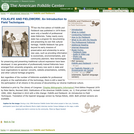
When the first edition of Folklife and Fieldwork was published in 1979 there were only a handful of professional state folklorists. Today nearly every state has a program for documenting and presenting its own folk cultural heritage. Folklife fieldwork has gone beyond its early missions of preservation and scholarship to serve new uses, such as providing information to economists, environmentalists, and community planners. New technologies for preserving and presenting traditional cultural expression have been developed. A new generation of professionally trained folklorists have emerged from university programs, and many now work in state and local organizations to sponsor concerts, Web site presentations, exhibits, and other cultural heritage programs. But regardless of the number of folklorists available for professional projects or the sophistication of the technology, there is still a need for the participation of all citizens in the process of documenting our diverse traditional culture. First Edition Prepared 1979 by Peter Bartis; Revised 2002.

This course explores connections between what we eat and who we are through cross-cultural study of how personal and collective identities, social relations, and economic inequalities are formed and maintained via practices of food production, preparation, and consumption. Discussions are organized around critical discussion of what makes "good" food good (tasty, healthy, authentic, ethical, etc.), and draw on anthropological studies as well as recent writing and films on the politics of food and agriculture. A primary goal of the course is to provide students with conceptual tools to understand and evaluate food systems at local and global levels. Instruction and practice in written and oral communication is provided.

Through investigating cross-cultural case studies, this course introduces students to the anthropological study of the social institutions and symbolic meanings of family, gender, and sexuality. We will explores the myriad forms that families and households take and considers their social, emotional, and economic dynamics.

In this lab students will learn how skeletal remains can be used to estimate the height of an individual. Students will measure several of their bones and the bones of a partner. They will then use a formula to estimate height and compare it to actual height.

A site that has interesting information on forensics and interactive activities for kids to play. The student will learn investigative techniques that will enable them to better understand the science of forensics. The use will explore new technology related to anthropology and forensics.

How and why do we participate in public life? How do we get drawn into community and political affairs? In this course we examine the associations and networks that connect us to one another and structure our social and political interactions. Readings are drawn from a growing body of research suggesting that the social networks, community norms, and associational activities represented by the concepts of civil society and social capital can have important effects on the functioning of democracy, stability and change in political regimes, the capacity of states to carry out their objectives, and international politics.
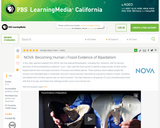
This video segment adapted from NOVA shows how scientists use the fossil record to trace when early human ancestors and related species began walking on two legs instead of four, and to determine whether they were more apelike or human in appearance.

This course aims to introduce students to the rich diversity of human culture from antiquity to the early 17th century. In this course, we will explore human culture in its myriad expressions, focusing on the study of literary, religious and philosophical texts as ways of narrating, symbolizing, and commenting on all aspects of human social and material life. We will work comparatively, reading texts from various cultures: Mesopotamian, Greek, Judeo-Christian, Chinese, Indian, and Muslim. Throughout the semester, we will be asking questions like: How have different cultures imagined themselves? What are the rules that they draw up for human behavior? How do they represent the role of the individual in society? How do they imagine 'universal' concepts like love, family, duty? How have their writers and artists dealt with encounters with other cultures and other civilizations?

This course covers French politics, culture, and society from Louis XIV to Napoleon Bonaparte. Attention is given to the growth of the central state, the beginnings of a modern consumer society, the Enlightenment, the French Revolution, including its origins, and the rise and fall of Napoleon.
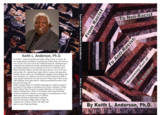
For years I’ve wanted to write a book about racism. But after visiting Barnes and Nobles, both online and our actual bookstore here in Boise, Idaho; I realized there were already volumes of books and articles written on the subject of racism. I asked myself, could I write a book on racism that would be different than the books already available? So, I started to think about my twenty years of personal experiences, conducting courses, giving seminars, lectures, and writing articles about racism. In those seminars, lectures and articles, I always wanted to make sure my students, the attendees , and readers learned something specific; something they could take home and use immediately. After realizing what I’d been doing for all those years, I decided that teaching something very specific about racism would make my book different. In all my lectures, seminars, courses and articles, I always had a primary goal; teach people how to move from being a non-racist, to becoming an antiracist. Everything I spoke, taught and wrote was about helping people to see where they really stood regarding racism and how to take the necessary action to becoming a positive change agent.
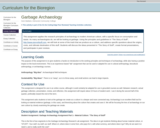
Students will look at the garbage we create as a culture in a deeper and more connected way and theorizing about the culture that creates and uses it. Designed for use in an online course, it could certainly be adapted for use in grounded courses as well.
(Note: this resource was added to OER Commons as part of a batch upload of over 2,200 records. If you notice an issue with the quality of the metadata, please let us know by using the 'report' button and we will flag it for consideration.)

This course examines the definition of gender in scientific, societal, and historical contexts. It explores how gender influences state formation and the work of the state, what role gender plays in imperialism and in the welfare state, the ever-present relationship between gender and war, and different states' regulation of the body in gendered ways at different times. It investigates new directions in the study of gender as historians, anthropologists and others have taken on this fascinating set of problems.

Personal study and examination of enviorment

This course examines the definition of gender in scientific, societal, and historical contexts. It explores how gender influences state formation and the work of the state, what role gender plays in imperialism and in the welfare state, the ever-present relationship between gender and war, and different states' regulation of the body in gendered ways at different times. It also investigates new directions in the study of gender as historians, anthropologists and others have taken on this fascinating set of problems. Students taking the graduate version complete additional assignments.

Gender Inequalities and the our experinces as a research team.